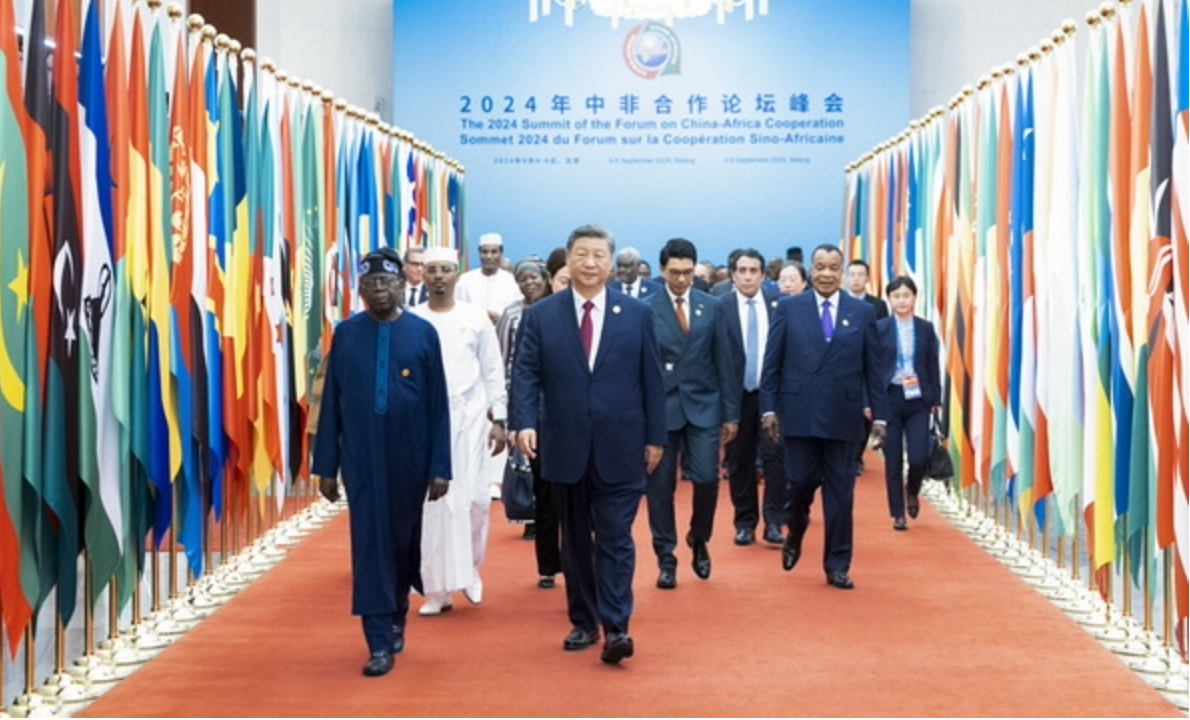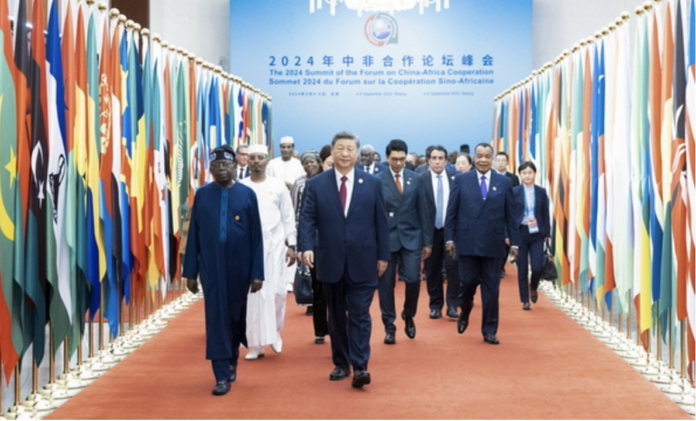“The friendship between China and Africa transcends time and space, surmounts mountains and oceans and passes down through generations.”
–Xi Jinping, 05/09/2024
To what the Chinese Ministry of Foreign Affairs has deemed to be the “largest diplomatic event hosted by China in recent years”, the 2024 edition of the Beijing Summit of the Forum on China-Africa Cooperation (FOCAC) has had the highest record of attendance of foreign leaders. Notable examples include:
- 51 African heads of state and government
- Two presidential representatives
- Chairperson of the African Union (AU) Commission
- Secretary-General of the United Nations, Antonio Guterres
It is worth noting, however, that not all 54 African nations were present at the Summit; Eswatini, the only African country that has diplomatic ties with Taiwan, constituted the only absence. This may be largely explained by the country’s diplomatic misalignment with China, who insists that present states sever formal ties with Taiwan in order to participate in forums it hosts such as FOCAC. As of today, Taiwan plays a crucial role in Eswatini’s affairs such as through its position as the country’s largest trade and aid provider after South Africa and by supporting its absolute monarchy.
The 2024 FOCAC Summit takes place every three years, and has just recently culminated on the 6th of September with a wide range of new initiatives and proposals to strengthen Sino-African relations. Since the forum’s creation in 2000, China has been heavily investing in Africa for resources the Chinese industry needs, and in loans and credit for major infrastructure projects as per the Belt and Road initiative. This year, the adjoining theme is “Joining Hands to Advance Modernization and Build a High-Level China-Africa Community with a Shared Future” to plot further cooperation and catalyse a shift in Chinese focus towards the hi-tech and green energy transition in Africa, something which many European and North American corporations have either hesitated or lacked the ability to pursue. This is precisely what has set China apart from Western countries and Russia, which focus predominantly on resource extraction and security assistance; China’s emphasis on investment in technology and renewable energy reveals its strategic foresight, positioning itself as the critical partner capable of aiding African states in their pursuit of modernization and anticipating many Western nations.
From an external standpoint, China appears to be a neutral and reliable partner to collaborate with African states without the discrimination from the allies of Moscow and allies closer to Europe and the USA. This comes at a time when, due to ongoing geopolitics, African nations have felt abandoned by their customary Western partners and allies; many African nations’ refusal to condemn the Russian’s invasion and Ukraine and their criticism of the USA’s response to the conflict has led to political fractions and tensions with the USA, which has created a vacuum of power that China is actively seeking to fill.
African state and heads of government with Chinese president, Xi Jinping
As the summit approaches its end, African nations are striving for opportunities to industrialize their economies, further increase and elaborate cooperation for Belt and Road projects, and expand agricultural exports to reduce a trade deficit with China. Concurrently, China is Africa’s biggest trade partner. However most of the continent’s exports to China are mostly minerals, fuels and metals not agricultural. Meanwhile China says annual trade volume should reach $300bn by 2035 and, before the next summit, China promises 360bn RMB to Africa with what Xi Jinping states “210bn yuan ($29.6bn) will be provided through credit lines, while there would be 70bn yuan ($9.9bn) in business investments.”
It is here that China and African nations’ goal to further modernization can be best observed, with the following ten partnership actions ranging from people-to-people exchanges to green development, trade prosperity partnership action, and common security and health training. However one question remains: how much progress can be expected take place before the next FOCAC meeting, and what should the US decide to do until then?
It is difficult to answer the first, but a suitable answer to the second would be for a reassessment on the behalf of the United States of its approach to Africa in light of China’s growing influence and new presence of the restructured Wagner Group. The incumbent U.S. foreign policy toward Africa focuses on security, economic growth, and promoting democratic governance, but should now cater to fostering deeper ties to prioritize partnerships to help African nations’ own development goals and industrialization. Furthermore, the U.S. should aim to strike a good trade balance with Eswatini for it to maintain its ties to Taiwan and thereby further counterbalance China’s influence by offering alternative investment and trade opportunities. In the Sudanese case, the U.S. should help stabilize the region and support the transition to civilian rule, which was derailed by the outbreak of violence. This also includes working with neighbouring countries to prevent regional spill-over of the conflict and setting up aid stations to counter famine. To other African nations, showing support by helping stabilize the Sudanese conflict is an effective way to showcase the U.S.’ support for African nations.
The key message the United States should take from this year’s FOCAC meeting and the ever-increasing Sino-African ties is that a more comprehensive, partnership-based strategy will allow it to regain some of the diplomatic ground it has lost to China in recent years.
Featured images courtesy of the Ministry of Foreign Affairs of the People’s Republic of China









